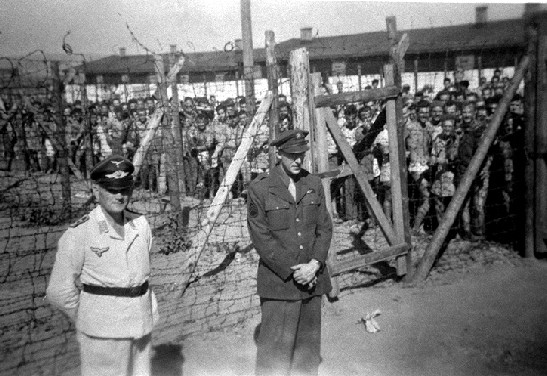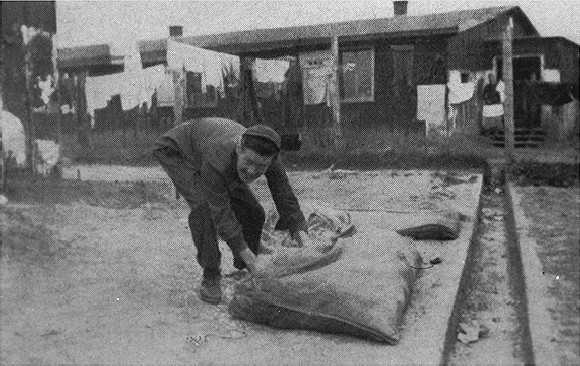|
Home
|
A Father's Day Open Letter to Senator Dick Durbin A real story of Nazi internment Senator Dick Durbin (D-Ill) - fax (202) 228-0400 Gentlemen: I'm writing about the words spoken by Senator Durbin on the floor of the U.S. Senate on June 15, 2005: When you read some of the graphic descriptions of what has occurred here -- I almost hesitate to put them in the record, and yet they have to be added to this debate. Let me read to you what one FBI agent saw. And I quote from his report: On a couple of occasions, I entered interview rooms to find a detainee chained hand and foot in a fetal position to the floor, with no chair, food or water. Most times they urinated or defecated on themselves, and had been left there for 18-24 hours or more. On one occasion, the air conditioning had been turned down so far and the temperature was so cold in the room, that the barefooted detainee was shaking with cold....On another occasion, the [air conditioner] had been turned off, making the temperature in the unventilated room well over 100 degrees. The detainee was almost unconscious on the floor, with a pile of hair next to him. He had apparently been literally pulling his hair out throughout the night. On another occasion, not only was the temperature unbearably hot, but extremely loud rap music was being played in the room, and had been since the day before, with the detainee chained hand and foot in the fetal position on the tile floor. If I read this to you and did not tell you that it was an FBI agent describing what Americans had done to prisoners in their control, you would most certainly believe this must have been done by Nazis, Soviets in their gulags, or some mad regime -- Pol Pot or others -- that had no concern for human beings. Sadly, that is not the case. This was the action of Americans in the treatment of their prisoners. I'm writing this letter, on this Father's Day, in behalf of my father, who is unable to write it. I'm relying on my memory of his stories in my childhood, plus what research I've been able to do. On December 7, 1941, my father was in his first semester of college. Like many young American men, he immediately signed up for the U.S. Army Air Force. After training in California, he was sent to Texas, where he was assigned to the crew of a B-24 Liberator bomber. They were to fight the war against those same Nazis you, Senator Durbin, reference. Just getting to Europe was harrowing - they didn't just fly across the Atlantic from the U.S to England. They had to fly first to West Palm Beach, Florida, then to Puerto Rico, then to British Guiana (presently Guyana) in South America, across to Africa, then north to England. They were in great danger from weather as they flew across the Atlantic, and from the Luftwaffe as they passed France. When they arrived in England, my father flew bombing missions against Nazi targets. On April 1, 1944, the crews were assembled for a morning briefing, and were given their mission - against a target in Switzerland. A Swiss plant, despite the country's neutrality, was making ball bearings essential to the Nazi war machine. As part of the briefing, the crews were read the apology the U.S. planned to send to the Swiss blaming the attack on a mistake. A similar plant was nearby in Germany. The crews reported to their planes, the engines were warmed up, and the mission was halted because of weather. That happed a couple of times before the mission was launched, and, unfortunately, not all of the planes were properly refueled, including my father's. The bomb run was completed and my father's plane headed back towards England. But because of the lack of fuel, they had to fly lower and slower than normal. Right in the range of the Nazi anti-aircraft fire. They were hit over France. All of the crew safely bailed out and scattered across the French countryside. My father landed in a small ravine, got his parachute buried, and began to look for help. A young French woman came walking up the ravine, and my father showed her the card they were all issued. It said, in French, that the holder was an American airman who had come to France to free them from the Nazis. It asked for help in getting to the French Resistance. The woman indicated for my father to stay where he was. Shortly, she came back - with a German soldier. My father was a prisoner of the Nazis. He was carried by train to the infamous Stalag-17B. It was located, not in the warm climes of Cuba, but in the frigid mountains of Austria. The prison was extremely overcrowded: (thanks to b24.net for the photo) The Americans occupied five compounds, each of which measured 175 yards by 75 yards and contained four double barracks 100 by 240 feet. The barracks were built to accommodate 240 men, but at least 4000 men were crowded into them after the first three months of occupancy. Each double barrack contained a washroom of six basins in the center of the building. The beds in the barracks were triple decked, and each tier had four compartments with one man to a compartment, making a total of 12 men in each group. Each single barrack had a stove to supply heat and cooking facilities for approximately 200 men. The fuel ration for the week was 54 pounds of coal. Because of the lack of heating and an insufficient number of blankets, the men slept two to a bunk for added warmth. Lighting facilities were very poor, and many light bulbs were missing at all times. (Map) The prison commandant, Oberst Kuhn, intentionally provided insufficient and poor quality food. The conditions were unsanitary - the plates the prisoners ate from were unwashed, in some barracks they had only pails for urination and defecation. The conditions combined with overcrowding to cause an epidemic of dysentery - which caused more unsanitary conditions. The men got sick, and stayed sick. Clothes, when washed, were hung on lines outside. Mattresses were made of straw. The International Red Cross was occasionally allowed to inspect, and had this to say: While no serious incident has occurred, prisoners are treated badly by certain guards. They have been threatened and some struck with gun butts and badly bruised. 24 cold water taps per wash room. Insufficient water from 6:30 to 8:00 AM and 10:30 to 12:00 and 4:00 to 6:00 PM. No hot water. Only 1 hot shower during the last two months. 4 latrine house pits are emptied every two or three weeks. There is a very bad smell partly due to the fact that the men burnt the lids as fuel. The Commandant promised to have the pits cleaned more often and provide more disinfectant. PP visit 7034 12-7-43 No change in bathing facilities. Entire camp has had one bath at central bathing station since May 30. The outside latrines are not used at night and the small latrines at the end of the barracks are in bad shape. PP 8696 6-16-44 Plus, these American servicemen had to deal with the Gestapo, such that even the delegate of the International Red Cross filed a formal complaint: Delegate lodged a protest to Kommandant in view of the repeated entries of civilian agents on the Gheime Staatspolizei (known as Gestapo) into the American compound. These agents have searched prisoners and barracks and have confiscated any food, tobacco or personnel belongings which prisoners may have possessed in excess of limits allowed. These agents appear particularly keen at confiscating American LogBooks. Commandant explained apparently with regret, that he was unable to alter this situation. He drew attention to the fact that the Gestapo has become an integral part of the Wehrmacht since the Reichfuhrer SS has taken over the Supreme command of the Erstazheer. PP 11018 1- (17-19)-45 On April 8, 1945, with Allied armies pressing them from both sides, the Nazis increased their brutality. The prisoners who could still walk, including my father, were marched out of Stalag 17 and into the frigid, snow covered Austrian countryside: The marching column was divided into eight groups of 500 with an American leader in charge of each group, guarded by about 20 German Volkssturm guards and two dogs. Red Gross parcels were issued to each man in sufficient amounts to last about seven days. During the 18-day march, the column averaged 20 kilometers each day. At the end of the day, they were forced to bivouac in open fields, regardless of the weather. On three occasions the men were quartered in cow barns. The only food furnished to PWs by the German authorities was barley soup and bread. Trading with the German and Austrian civilians became the main source of sustenance after the Rod Cross parcel supplies were exhausted. The destination of the column was a Russian prison camp 4 kilometers north of Braunau. Upon arrival, the PWs cut down pine trees and made small huts, since there was no housing available. Roaming guards patrolled the area and the woods surrounding the area, but no escape attempts were made because it was apparent that the liberation forces were in the immediate vicinity. Liberation forces were indeed in the vicinity. On May 3, 1945, six men from the American 13th Armored Division arrived in three jeeps and captured the German guards. More of the 13th AD quickly arrived. My father always had a fondness for tankers. My father was sent back to the U.S. weighing about 60-lbs less than when he was captured. He was given 30-days leave. I think the Army hoped home cooking would help fatten him up again. Then it was on to Texas and training in the newer B-24s. After all, there was still the war against the Japanese to be fought. But, Hiroshima and Nagasaki happened before he was sent overseas again. At least in this war. So Senator Durbin, to your statement: "If I read this to you and did not tell you that it was an FBI agent describing what Americans had done to prisoners in their control, you would most certainly believe this must have been done by Nazis ... ." I would answer, No, I would think no such thing. You should be ashamed of yourself for suggesting it. The treatment my father received was far, far worse. And remember Americans and British were considered Aryans by Hitler and were treated far better than the Slavs, Russians and Jews. Senator Durbin, you should do the honorable thing and resign from the Senate for such a statement. Senators Nelson and Martinez, if he does not resign, as my representatives, I want you to sponsor and support a censure resolution. Update - Barabara at Quid Nimis voices her opinion. |

